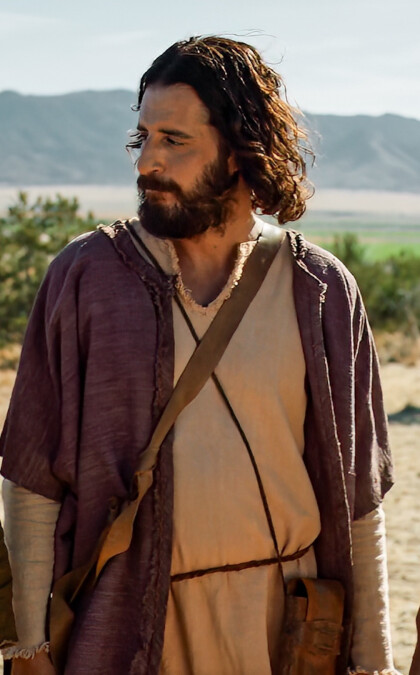The Joyful Exchange
A divine exchange took place on the cross: Jesus bore the punishment we deserved. Pilate did everything he could to set Jesus free. He decided to make the people choose between Jesus and Barabbas - a murderer, expecting them to set Jesus free. But things turned out differently...
Author: Wilkin van de Kamp

Pontius Pilate was the Roman governor over Judah for ten years, from AD 26-36. He fell under the proconsul of Syria, who in turn fell directly under Emperor Tiberias, making Pilate the highest Roman authority in Judea.
Likely a nickname for his role in the Battle of Pontus, Ponius held headquarters in Caesarea but would stay in Jerusalem during the holidays to prevent disturbances. According to the historians Philo and Flavius Josephus, Pilate was a cruel and corrupt man, a harsh ruler who frequently provoked the Jewish population. In AD 36, Pilate—after several complaints—was called to Rome to answer for his policies. He was interrogated, imprisoned, and likely committed suicide to escape execution by Emperor Galigula.
Pilate considers Jesus innocent
Pilate’s story is interesting because he played an integral role in Jesus’ death just a few years before his own. The Jewish leaders handed Jesus over to Pilate at the Pretorium, where the Roman governor stayed during the holidays in Jerusalem, a location with 600 Roman soldiers stationed at the barracks. Pilate acted according to Roman law, which required that no one be condemned without a hearing.
Jesus was interrogated by Pilate three times, and each time Pilate came to the conclusion: “I find no basis for a charge against this man!” (Luke 23:4, NIV). And moments later he declared, “You brought me this man as one who was inciting the people to rebellion. I have examined him in your presence and have found no basis for your charges against him. Neither has Herod, for he sent him back to us; as you can see, he has done nothing to deserve death” (Luke 23:14-15, NIV). Pilate knew that Jesus was not a political rebel—there was no high treason against the emperor and the state. Pilate knew what we know—Jesus was an innocent man.
I find no basis for a charge against this man!
Two men called Jesus, two ways of life
Pilate did everything he could to free Jesus. It had become a tradition that during the Feast of Passover—the celebration of deliverance—one prisoner would be released as a gesture of goodwill to the Jews, to win their favor.
Mark 15:7 tells of Barabbas, who had been imprisoned along with several other rioters for killing someone. He had chosen the path of violence to achieve his political goals and was on death row, awaiting his crucifixion. There was no hope for him. Interestingly, we read in Matthew 27:16 that his full name was Jesus Barabbas, or “Jesus, son of the father.”
How remarkable that there are two men named Jesus in this story. Barabbas was the opposite of Jesus—a violent rebel, a murderer who deserved the death penalty. Jesus, on the other hand, had stirred up the city by healing the sick and raising Lazarus from the dead. The two could not have been more different. One ruled by taking someone’s life, the other by giving his life. One was guilty, the other innocent.
The choice of the people
Pilate decided to let the people choose, expecting them to release Jesus. He asked the crowd, “Which one do you want me to release to you: Jesus Barabbas, or Jesus who is called the Messiah?” (Matthew 27:17, NIV). The crowd, stirred up by the high priests and elders, shouted loudly, “Barabbas!” Hoping for another answer, he asked, “What shall I do, then, with Jesus who is called the Messiah?” (Matthew 27:22). The incited crowd was relentless. “Crucify him!” (v. 23) Pilate tried one last time to save the situation: “Why? What crime has he committed?” (v. 23).
Pilate symbolically washed his hands and said, “I am innocent of this man’s blood” (Matthew 27:24). The most powerful man in the country failed to release Jesus. After all, it was God's plan for Jesus to die in our place—not even Pilate could change that.
The true Son of the Father took on the guilt, shame, and death that Barabbas deserved. Jesus took his place—for us. He chose to die on the cross that was meant for Barabbas, a murderer whose chains were loosened and was set free.

The exchange
Barabbas symbolizes the lost sons and daughters of Adam. God showed Barabbas—and us—his great love by sending Jesus to die in our place. I don't know if Barabbas understood what happened that day on Calvary. The question is whether we realize what Jesus did for us there. Do we understand how Jesus bore the punishment we deserved so that we could have free access to God the Father?
A divine exchange took place on the cross: Jesus bore the punishment we deserved (see Isaiah 53:5). Jesus took the punishment that was meant for Barabbas, a punishment we, too, deserve. The theologian Charles Spurgeon once said it like this: “Christ became what we are so that we may be what He is; He bore our sins so that we may bear his righteousness.”
Christ became what we are so that we may be what He is; He bore our sins so that we may bear his righteousness.
The Struggle of Luther
Martin Luther, the great 16-century church reformer, struggled throughout his life with the question of how to be justified (approved and accepted) by God. After law school, he entered the monastery to live as purely as possible, but he did not succeed.
Like Paul, he called himself “full of zeal and faultless” (see Philippians 3:6). Yet he knew that, by himself, he could not keep the law. Therefore, he led a life of penance. But was it ever enough? When would he be good enough?
In his early days as a monk, he exhausted his confessors with hours of self-examination of minuscule sins and dubious thoughts, fearing he might die without having confessed all his sins. One of the priests told him, “My son, God is not angry with you, you are angry with God.” Luther’s confessor was right. He was angry with God because he felt he could never meet God's requirements to be approved and accepted. He continued seeking an answer to the question on how to be justified with Christ.

The quest for redemption
Luther lived intensely by the Bible in the hope of becoming a better Christian. He was driven by the fear that he could not meet God’s expectations. Luther thought you had to be a good Christian to be accepted by God. But when are you good enough?
In his quest for salvation, Luther even made a pilgrimage to Rome, where, like many other pilgrims, he climbed the Scala Santa, the holy staircase. According to tradition, this staircase comes from the palace of Pontius Pilate—the staircase that Jesus climbed to be shown to the people. In the year 326, the Empress Helena had the staircase transferred from Jerusalem to Rome. The Pope at that time proclaimed that anyone who climbed the stairs on his knees would receive remission of all his sins. Luther also climbed these stairs.
As he was climbing, Luther reportedly heard a voice quoting a verse from the Bible book of Romans, “The righteous will live by faith” (Romans 1:17, NIV). In his letter to the Romans, Paul quotes Moses' farewell address: “But the righteousness that is by faith says: ‘Do not say in your heart, “Who will ascend into heaven?”’ (that is, to bring Christ down) or “Who will descend into the deep?” (that is, to bring Christ up from the dead)” (Romans 10:6-7, NIV).
By this Paul meant that Israel did not have to ascend to heaven because God Himself had descended to them to reveal His Word. Likewise, we do not have to climb ladders to heaven to be approved and accepted by God. God has come to us in Jesus, the living Word.
A spiritual breakthrough
In the end, it was this verse in particular that opened Luther's eyes: “God made him who had no sin to be sin for us, so that in him we might become the righteousness of God” (2 Corinthians 5:21, NIV). This truth led to a spiritual breakthrough in his life. Luther called this the “great exchange”— on the cross, Jesus became one with our sins and with God's judgment for those sins; in return, we may now become one with Him, through which the holy God accepts us in Christ as his beloved children.
God does not demand that we live righteously, but He grants us a righteous life! After this discovery, Luther prayed, “Lord Jesus Christ, You have taken upon You what is mine, and given me what is Yours. You have taken upon You what You were not, and have given me what I was not.” Luther also called this the “blissful exchange,” saying, “He our hell, we his heaven. He our guilt, we his acquittal. He our iniquity, we his righteousness. He our death, we his life.”
God made him who had no sin to be sin for us, so that in him we might become the righteousness of God.
Luther's discovery
Through Paul's teaching, Luther discovered that he had completely misunderstood God's righteousness. He discovered that we do not have to become righteous ourselves but are made righteous by God:
“For as by one man’s disobedience many were made sinners, so also by one Man’s obedience many will be made righteous” (Romans 5:19, NKJV).
“And that is what some of you were. But you were washed, you were sanctified, you were justified in the name of the Lord Jesus Christ and by the Spirit of our God” (1 Corinthians 6:11, NIV).
To be righteous means that God, in union with Christ, has fully approved and accepted you as his beloved child. The Heidelberg Catechism puts it this way, “God imputes to me the perfect satisfaction, righteousness, and holiness of Christ; even so, as if I never had had, nor committed any sin” (Sunday 23). “Imputing” means that you have done nothing for it and it is given completely as a gift.
Paul says: “But how much greater is the result of what was done by the one man, Jesus Christ! All who receive God's abundant grace and are freely put right with him will rule in life through Christ” (Romans 5:17, GNT). Other translations speak of “the gift of righteousness.”
So it is not about your own righteousness, but his righteousness. Because Jesus was approved and accepted by God, you—in union with Him—are also approved and accepted by God.


Want to know more about the exchange?
Want to delve further into the sacrifice Jesus made for you? Then sign up for our online course on The 7 Wonders of the Cross!
In this course, you will travel with Wilkin van de Kamp to the seven places in Jerusalem where Jesus bled, to understand what this means for us. All these events were predicted hundreds of years earlier, willed and prompted by God.
Join us on this journey of discovery and reflect on what this means in your life.



